



Another random document with no related content on Scribd:
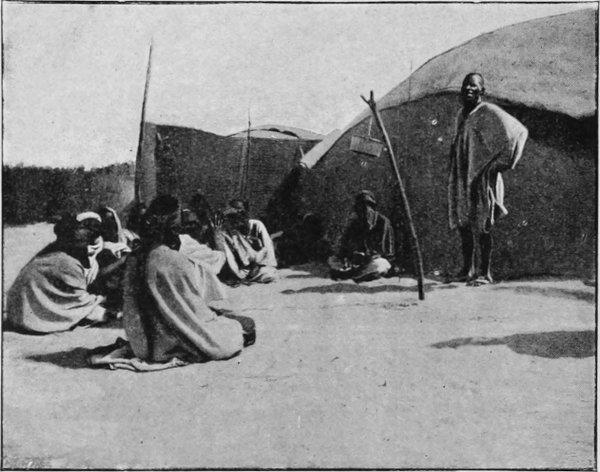
TUAREGS AND SHERIFFS AT RHERGO.
The palaver ended amicably enough, and presently other Tuaregs crossed the creek in canoes to swell the numbers of our visitors. We now made acquaintance with one of their most characteristic and at the same time detestable peculiarities, namely, their incorrigible love of begging. I know well enough that the poor fellows have nothing to depend on but their flocks and the produce of their fields, which are cultivated for them by the negroes, who are paid by a certain royalty on the results. Our arrival, laden with fine stuffs, wonderful glass beads, and all manner of gewgaws, must of course be turned to account as much as possible. Naturally they exaggerated our resources, and the word ikfai (give me) became a refrain dinned into our ears every day for months. I must add, however, that no Tuareg ever in my hearing enforced his begging by a threat. I gave often and I gave much, for my firm belief is, that the one way for a traveller to succeed is to conciliate the natives and win the sympathy of the people through whose country he is passing. It is best for his own interests, and also for those of future explorers, to be generous
whenever it is possible, but he should never give against his will, or give anything but just what he himself chooses.

OUR PALAVER AT RHERGO.
I often yielded to respectful and courteous importunity, but would never have done so in compliance with a demand, which would have made a free gift appear like a compulsory tribute.
Amongst our new friends was the son of Madunia, the centenarian chief to whom I have already alluded. He was only about twelve years old, an incidental proof of the vigorous constitution of the Tuaregs, or perhaps rather of the truth of the reply of a celebrated doctor to an inquirer—“Men sometimes have children at fifty, at sixty never, but at eighty always.”
My little friend had a very pretty face but a very bad temper. I made him very angry by putting a five franc piece in a calabash full of water, which I defied him to pick out. He looked at me with a cunning expression and put out his hand, but directly he touched the water he gave a scream and fell backwards, holding his arm as if in pain. The fact was, I had put a bit of Ruhmkorff wire, of which I had a
coil hidden in my tent, in the bowl. The poor boy was furious, and when the people standing about laughed at him, he wept with rage. I consoled him with a present, and in the end we parted the best of friends.
The next day before we started some more Tuaregs came to see us, and I must add to beg a little present. Two of them, with a confidence in us which quite touched us, went with us on the Davoust, and remained on board till twelve o’clock, proving how completely reassured they were as to our intentions. One was the son of R’abbas, the other his brother R’alif. The former was only about ten years old, and did not as yet wear the veil. Both were very fine specimens of the physical beauty which, as I have already said, characterizes the Kel Temulai race.
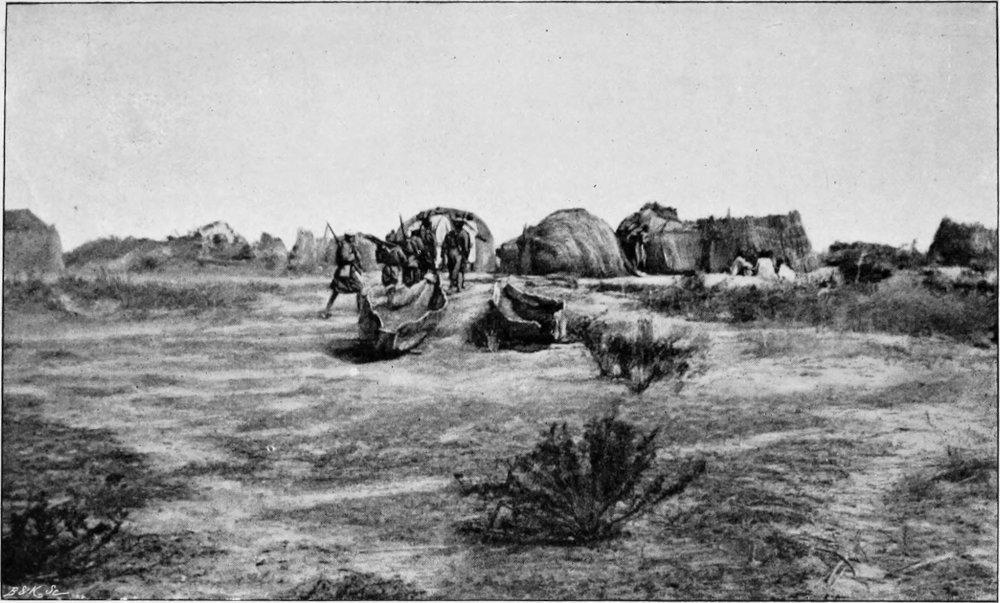
On the 6th, still much bothered by the contrary wind, we reached Rhergo, a very large village, more ancient even, it is said, than Timbuktu, which rose in importance at the expense of its older rival.
ARRIVAL AT THE VILLAGE OF RHERGO.Recently, however, through the culpable policy which left the districts surrounding the French settlement unprotected, Rhergo has regained some of the trade of Timbuktu. A razzi or raid of Hoggars, the Tuaregs from the south who murdered Flatters, cut short the growing prosperity of the capital by almost completely ruining it. I was surprised to hear about the Hoggars so far from their usual haunts, but what I have just said is true enough, as will presently be proved.
We made all our arrangements for spending a few days at Rhergo, so as to give Abiddin time to communicate with us.
The next day the natives decided to open relations with us, and a deputation came to interview us the first thing in the morning. We saw them filing along the path leading from the village, which was almost three quarters of a mile off. Before actually entering our camp they halted, and each one of them made us a solemn salaam. Protestations of friendship, offers of services, expressions of devotion followed. Finally a paper was handed to us with very great ceremony, which turned out to be a protectorate treaty which had been concluded with Timbuktu.
There exists a perfect mania in Africa for so-called treaties, a mania which would be harmless enough if it did not give an altogether false idea of colonial questions to French people, who are ignorant of the true conditions of the countries to which they refer.
These treaties, in fact, very often prove bones of contention and litigation between different European powers, and thus attain an importance which but for this would be altogether wanting. In the partition of Africa European governments began by imagining a kind of rule of the game, which consisted in giving to so-called treaties with native chiefs a certain fictitious value. We fell in with this idea, and it would be difficult now to go back to the old belief, that in a game of chance the ace is more powerful than the king. To follow the fashion therefore when we appear on the boards before international conferences, we have to be provided with plenty of trumps, and to produce treaties with people, shady folk enough sometimes, whom we dub for the nonce kings or princes. Our treaties are as valid as
those made by Germans, Spaniards, or Italians, and all of them added together, if truth and good faith were considered, would amount simply to zero, as I shall presently have occasion to prove.
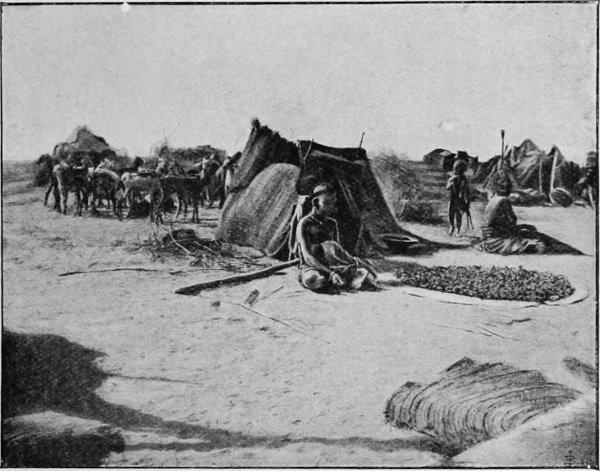
TRADERS AT RHERGO.
But when there is no special reason for pretending to the contrary, what is the good of having such endless diplomatic rigmaroles and such long-winded treaties, of which one of the contracting parties does not understand a single solitary sentence?
Imagine then my astonishment at seeing on the commercial treaty between Rhergo and Timbuktu, that the former place was bound to pay an annual tribute to the French! Now if any one is in authority at Rhergo it is Sakhaui, chief of the Igwadaren, and not the French,—I speak now of course of when we were passing through on our voyage down the Niger,—so that this promised tribute, which was never paid, never even demanded, was certainly not calculated to add to French prestige in these parts.

SO-CALLED SHERIFFS OF RHERGO
The people of Rhergo, who were worse than cunning, pleased us but little. They called themselves sheriffs, or descendants of Mahomet, but I think they would find it difficult to prove their parentage, for they have neither the beauty of feature nor the paleness of complexion characteristic of true Arabs.
In the evening Sidi Hamet returned to us from his visit to the Igwadaren. He had been pretty well received by them, but when he told them of our imminent approach they took fright, and thinking that our party was a large and formidable one, they wanted to leave the banks of the river and take refuge in the interior.
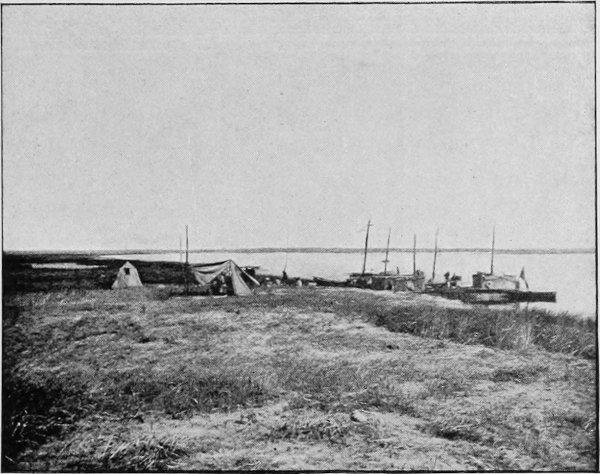
THE ‘DAVOUST’ AT ANCHOR OFF RHERGO.
Their women, however, cried shame on them, reproaching them for losing such a chance of presents; and to cut short all further discussion, they threatened that any man who was coward enough to flee from an imaginary danger would have to go without his wife.
The prospect of having their wives imitate the strike of the women of Mycenæ, as described by Aristophanes, put a stop to the desire of the husbands to decamp, and Sidi Hamet wound up by telling me that all was now arranged for our friendly reception. Amongst the Igwadaren he had seen Mohamed Uld Mbirikat, the cousin of my friend Bechir, to whom I had a letter, and he brought back with him a rifle which had been taken from Colonel Bonnier, and had remained for some time in the possession of the chief of the Eastern Kel Antassar On hearing of our arrival the chief, not liking to keep anything so compromising, had hastened to give the rifle to Mohamed.
The fact is, if we could only have gone immediately to Sakhaui we should no doubt have been well received; but unfortunately we had
promised Abiddin to wait for him at Rhergo, and during the delay our enemies, especially the marabouts, had plenty of time to poison the minds of the natives against us.
On the 8th Taburet and Father Hacquart went to the village, where they met with a merchant of Timbuktu whose goods had been stolen by an Igwadaren named Ibnu, a relation of Sakhaui, who had probably been sent to Rhergo to spy on us. The merchant wanted to complain to us, but the chief of the village told him that if he did he would cut his throat when we were gone.
This chief being very infirm, I sent for his son and read him a good lecture. I also sent for Ibnu, who came at once, and protested his repentance for what he had done. I pretended to accept his excuses, and presently he reappeared dragging two goats behind him, which he offered to me. I accepted them, earnestly hoping that he had stolen them from the sheriffs of the village, who pleased me less and less. Then I in my turn gave him some presents, notably a garment for his wife.
The next day we had a visit from Alif, the brother of Sakhaui, who offered us a fine bull. We killed it with a shot from a Lebel rifle, which alarmed the Tuaregs not a little. The next day, the 9th, back comes Ibnu with another goat, this time for sale. But the chief object of his visit is to ask for another length of stuff for the dress I had sent to his wife, who he explained was as big round as our tent, and the material I had given him would only dress one-half of her. From the Tuareg point of view she must have been a splendid woman, for amongst this tribe weight counts as beauty. The desired corpulence is obtained by eating quantities of a mixture of which curdled milk is the chief ingredient, in fact, they fatten themselves up much as the French do the geese which are to produce paté de foie gras.

POLITICAL ANXIETIES
Clouds were now beginning to gather on our political horizon. Our prolonged sojourn at Rhergo, where we waited in vain for letters from Abiddin, must have seemed very strange to the Tuaregs, who can have had no inkling of the reason. Moreover, a courier had come down in a canoe from Timbuktu to see us, and though I sent him away immediately, I felt sure that he had been seen. Putting myself in the place of Sakhaui, and knowing the distrustful nature of the Tuaregs, I was convinced that in his mind we were the advance guard of a more numerous party who were to come from Timbuktu, and of whom he stood in dread. The arrival of the courier would be enough to confirm his suspicions. It was very evident that we ought to start at once, if indeed there was still time for us to open really cordial relations with the Igwadaren. Between two aims of an importance so unequal I thought it would be wise to make a final choice. Now to us French the Igwadaren were really not worth much, and besides, had not they also a protectorate treaty with Timbuktu? whilst, as I have said before, the good-will of the Awellimiden would be of vital value to us, and I would not, if I could possibly avoid it,
lose the advantages which Abiddin’s visit to them might win for our expedition.
On the evening of the 10th, however, all my fine plans were completely upset. Sidi Hamet, who had been to the village, came back with a letter for me, which had been brought by a Tuareg and given to a slave belonging to one of the sheriffs. Strange postal arrangements indeed! Taken in connection with the news brought to us by Sidi Hamet, the letter was perfectly incomprehensible. In it Sakhaui begs me to return to Timbuktu, where he says I shall find all that I could hope to meet with further away; indeed, he pledges himself to secure my success. At the same time, if we choose to go on he will watch over us, but towards the end his letter becomes almost threatening, for he says, “Take care, above all things beware of doing any harm to any of my people!”
The next day Sidi Hamet started with a letter, and he returned at midnight not alone, but accompanied by a big Igwadaren of manly bearing and intelligent countenance, who answered to the name of R’alli.
The letter from Sakhaui, he now explained to me, had been written for him, as, like all Tuaregs, he did not know how to write himself, by a marabout named Kel es Suk, and his meaning had been completely distorted. Sakhaui was perfectly well-disposed towards us, he was impatiently awaiting us, etc., etc.
Of course I only half believed what our friend R’alli said. Moreover, he added that the marabouts, especially one who was at Kabara before we arrived, were trying to get up an agitation against us. We had now been waiting in vain for more than a week for news of Abiddin, and I began to think we should never hear from him, so I decided to go to Sakhaui, who, as already stated, was then chief of the Igwadaren.
On the 14th we anchored close to a little tongue of land which separates a lagoon, forming an admirable port, from the river. We were told that the camp of Sakhaui was behind the dunes which we could see from our anchorage.
In the evening we were hailed from a canoe by an Arab of stunted growth, with masses of long matted hair and bright, intelligent eyes. He turned out to be the chief attendant of Mohamed Uld Mbirikat. His name was Tahar, and he had been a follower of the great Beckay, the friend of Barth.
He brought us bad news. Mohamed was ill with fever, but, he added, for all that he would probably join us the next day.
The next morning we went round the peninsula, entered the little lake called Zarhoi, and cast anchor opposite the spot we had just left. Faithful to his promise, Mohamed caught us up on our way there.
About ten o’clock the beach, which had been deserted on our arrival, became full of life and animation, for envoys arrived from Sakhaui, his brother, a dirty fellow, more ragged than any Tuareg I had yet seen, leading the way, with the chief of the Kel Owi, a tribe belonging to the little confederation which has taken the general name of the Igwadaren.
The palaver began at once: Sakhaui is ill, besides, there is no need for him to come himself, as his messengers are authorized to speak for him.
In fact, the reception was not exactly what Sidi Hamet and R’alli had led us to hope. However, Mohamed confirmed what our messenger had said, telling us that Sakhaui had sent for him a few days before to ask his advice, and he having assured the chief that he would run no danger by doing so, the great man had said he would receive us in person.
It was evident that since then the marabouts had accomplished their purpose, describing us as traitors, perhaps even magicians armed with terrible powers. In fact, according to their usual custom, they had done all they could to prevent Europeans from entering into confidential relations with the Tuaregs, for of course such relations would be fatal to their influence.
Sakhaui’s absence put me out dreadfully. Not that I was particularly anxious to see him, for I had no proposals to make to
him, he being under the direct control of the authorities at Timbuktu; but I feared, and that with very good reason, that if he, the first chief we passed on our way down the river, would not see us, his example would be followed by all the other Tuareg leaders. It turned out just as I expected.
Mohamed went to Sakhaui’s camp to try and persuade him to come to us, but it was all in vain. To make up for his absence, however, our friends of the morning came with others to beg for presents, and I treated them liberally, for this was my last trump card, and by playing it I hoped to induce their chief to see me.
We had other things to worry us. To begin with, the Aube leaked terribly. We had to take everything out of the hold, and we tried to stop up the fissures in her bottom, through which the water poured, with lumps of putty, but it was not much good, and throughout the whole of the rest of the voyage we were haunted with the fear of losing one of our vessels, or at least of having to leave her behind us.
Then one of my coolies, Semba-Sumaré, was very ill with pneumonia, and Dr. Taburet was afraid he would die. He was delirious, but fortunately quiet enough. Still he required careful watching, lest in an access of fever he should be guilty of some mad freak.
We remained where we were for the whole of the 16th, and our friend R’alli came on board to tell us, in his comically eloquent way, that Sakhaui really would come to see us. He was very uneasy about us, pulled this way and that, many of his advisers urging him not to visit us, but he, R’alli, would make him do so!
There might have been something in what R’alli said, and although I did not much believe in his influence over the chief, I gave him a nice present. It never does to be niggardly with these natives, one must advertise oneself well by generous gifts.
In the evening the number of visitors increased yet more, and we saw a good many people who were interesting to us, because they or their relations had been mentioned by Dr. Barth, including the son
of El Waghdu, who had been the German traveller’s faithful friend on his journey, and Kongu, a little Tuareg who had been very fond of him, and who, in spite of certain sad presentiments he had had of a terrible fate, had survived until now, so many years after the death of the Doctor himself. Every one still talked of that doctor under the name of Abdul Kerim, every one still remembered him, and once more I must bear witness, as I shall have to do yet again and again, to the wonderful impression left behind him by the genial German.

SAKHAUI’S ENVOYS.
Whilst we were chatting with our visitors some envoys from Sakhaui arrived, bringing back the presents I had given to R’alli in the morning. “He is a low impostor,” the chief had told his messengers to tell me; “I am ashamed of his behaviour, for he never ceases to talk, without rhyme or reason, and he promised to give us a cow as a present when every one knows he has not got one.”
R’alli sent to ask if I would see him again, and when I replied that I would, he came and held forth for a long time. He began by declaring that he wished he were dead. He wanted to return the
presents, extraordinary desire indeed in a Tuareg. As he went on the people standing by began to make hostile demonstrations, daggers were half drawn from their sheaths, and for a moment I feared that the whole thing was a farce got up with a view to pillaging us in the confusion of a pretended tumult. But I was wrong, and the weapons were sheathed again without having drawn any blood. The other Igwadaren were really jealous of R’alli, because they thought he had been better treated than themselves, and they were also perhaps indignant with him for the friendly feeling he had manifested for us. If R’alli really was a humbug, as I always fancied he was, yet he had been the first to approach us without any of that stupid suspicious defiance which so long prevented us from living on really good terms with the Tuaregs. All this I explained to the assembled crowds as best I could, winding up with, “If R’alli really is so little worthy of confidence, wasn’t it too bad of Sakhaui to send him to us at Rhergo as his accredited messenger?”
Moreover, I declared that I meant to do as I choose with my own property, even if I gave it to a slave or a dog, so I ordered R’alli to take back his presents, which he was evidently glad enough to do, and all ended peaceably.
We also had a visit from Achur, the brother of Sakhaui, chief of the so-called imrads or serfs, and the son of the chief of the Eastern Kel Antassar, who, though he had not joined his relation N’Guna in his struggle against the French, had nevertheless withdrawn on our approach.
I had now lost all hope of seeing Sakhaui. Was he afraid of compromising himself with his people? I wondered. Had the marabouts incited him against us by rousing his fears of some hostile intentions on our part? The best plan, I thought, would be to give up urging him to visit us, and to go to his brother and enemy Sakhib, whose camp was opposite to his on the other side of the river.
Our passage through the country, if it did not do much good, could not do much harm either. So near to Timbuktu, with people all virtually under French protection, I should not venture to engage in
any diplomatic or military enterprise on my own account, for of course to do so would be to encroach on the province of the supreme authority in the French Sudan. Is it too much to hope that our gentleness and our patience will make it easier later to establish really satisfactory relations with the Tuaregs? We shall have shown by our conduct that we are not the ferocious beasts our enemies chose to represent us to be. Moreover, some of the Tuaregs, no matter how few, will be grateful for the presents we have given them, and as those presents really were very handsome ones, I hope that the fame of our generosity will precede us, and incite the tribes through whose territories we have to pass to make friends with us.
To avoid having to give any more presents we got under sail early on the 17th, but the wind got up and compelled us to anchor amongst the grass at the entrance to the Zarhoi lagoon. We were scarcely gone before, as we had foreseen, the Igwadaren arrived in numbers at the scene of our recent encampment, and were greatly discomfited at finding that the goose which laid the golden eggs had flown away. But they soon spied us in our new anchorage, and hurried to hail us, entreating us again with eager gestures and shouts to land. They wanted to re-open the profitable intercourse with us, but the comedy was played out now. At about eleven o’clock we were able to resume our voyage along the left bank, followed for some little distance by a regular cavalcade, amongst whom Sidi Hamet thought he recognized Sakhaui himself. We now crossed the river, and cast anchor near another tongue of land a little above Sakhib’s camp at Kardieba, where Mohamed Uld Mbirikal was to rejoin us.

OUR COOLIES’ CAMP AT ZARHOI
It soon became pretty evident that we should see no more of Sakhib than we had of Sakhaui. If he had wished ever so much to pay us a visit, his dignity would have compelled him to act exactly as his brother had done. His envoys, however, duly arrived, charged with friendly messages, and accompanied, or rather preceded, by Mohamed.
By right of birth Sakhib is the true chief of the Igwadaren. His brother turned against him, and seduced a part of the tribe from their allegiance, on account of a love affair which was related to me as follows: a belle of the neighbourhood had been the mistress of Sakhaui when still quite a young girl. Knowing nothing of this, Sakhib, enamoured of her charms, married her with an ingenuous haste by no means peculiar to Africa, and discovering too late that he had been forestalled, he repudiated her. This modern Helen then returned to form a new union with her former lover Sakhaui. Inde iræ.
The story may or may not be true, but my private opinion is that the real reason for the enmity between the brothers is to be sought in the Igwadaren character, which is also the cause of the state of perpetual anarchy in which the natives live, resulting in the absolute ruin of the Niger districts from Rhergo to Tosaye.
I shall have more to say later of the peculiarities of the Tuaregs, but I prefer to relate my experiences amongst them before I presume to pass judgment on them. I think very highly of them in many respects, but for all that I do not shut my eyes to their defects. In the interests of truth, however, I wish to remark here, that from the very first I saw reason to draw a broad line of demarcation between what I may call the large confederations, ruled by laws sanctioned by long tradition, and the small tribes altogether inferior to them in morality, which may be said to form a kind of scum on the borders of the more important societies.
There are, in fact, certain hordes of mere brigands, who obey no chief, and depend entirely for their livelihood on robbery and pillage, and there is also amongst the Tuaregs, with whom we have now especially to deal, one important tribe which has gradually, partly from the ambition to be independent and to obey no laws but its own, and partly from contact with the foreigner, has lost all the virtues of the Tuaregs and retained all their defects.
The tribe to which I allude is that known as the Igwadaren, from which sprang the Ioraghen, who form so large an element in French Algeria, and for a long time they were the allies, or rather were subject to the Awellimiden. Just at the time of Barth’s voyage they had tried to separate from the rest of their tribe, and relying upon the aid of the Fulahs, who had invaded Massina, to get the upper hand. From Barth’s narrative we know that the great desire of his protector El Beckay was to prevent the division, and his greatest grief the fact that he failed to do so.
The Awellimiden repulsed the Fulahs, and since then the Igwadaren, traitors to their fellow-countrymen, have been looked upon by them as enemies whom they were justified in raiding
whenever they got the chance, and really I cannot blame them, for it serves the Igwadaren right.
When for the second time El Hadj Omar and his Toucouleurs tried by force of arms to restore the supremacy of an intolerant and barbarous Islamism, El Beckay, as we have already said, rose up against him in the cause of tolerance and a more humane interpretation of the doctrines of Mahomet. The Awellimiden, with the Iregnaten of the right bank of the Niger, were his auxiliaries. The great leader, as we have seen, died before his work was done, but he had broken the shock of the storm. A last wave of the tempest of revolt which had arisen in the west surged up to the walls of Timbuktu, which had been reached by an army of Toucouleurs, but they were surprised and massacred near Gundam. Once more the Tuaregs were saved, and all the prudent measures of Tidiani, the politic successor of El Hadj, could not advance the invasion by so much as a single step. It taxed to the uttermost all the resources of his astute and supple genius to maintain the territory already conquered in a state of servitude. It was reserved to the French to drive from it his cousin and successor Amadu.
In all the struggles which followed, however, and peace was not restored for thirty years, the Igwadaren always, if it were anyhow possible, sided with the foreigner against their fellow-countrymen.
The state of anarchy which began with the chiefs of course spread downwards amongst the mere warriors, and whilst amongst the larger confederations of tribes there are certain traditions checking the unrestrained use of brute force, there is nothing of the kind with the Igwadaren, with whom might is right. Sakhaui and Sakhib, brothers though they were, came to open blows. Each warrior of the tribe joined the leader he preferred, but this very fact reduced the power of both to next to nothing. The negro villages passed into the possession first of one side and then of the other, according to the varying fortunes of war, and the traders had their goods stolen with no hope of redress. The result in the ruin of the country was only too patent to every one’s observation.
The arrival at Timbuktu of the French was a very lucky thing for the Igwadaren. As they could no longer count upon the support of the Toucouleurs, who were at loggerheads with us, they might easily have been reduced to servitude by the Awellimiden, and no doubt but for our presence they would in their turn have become, as had so many others, mere imrads or serfs.
Acting on the wise advice of Mohamed, Sakhaui sent some messengers to Timbuktu. He had signed, or was supposed to have signed—for no Tuareg can read or write Arabic—all the treaties he was asked to, and that all the more readily that he did not understand a single word of their contents. Whilst expressing all the good feeling towards us of which he had just given our party such a striking proof, he sheltered himself under our moral protection against his powerful neighbours on the east. Having thus turned the presence of the French to the best possible advantage, and that really very cleverly, Sakhaui and his people were free to continue their evil doings unchecked, whilst Sakhib, at war with his brother, also knew as well as he did how to play his cards in the diplomatic game.
The one thing then which the Igwadaren dreaded was, that the French should make an alliance with the Awellimiden, for that would upset all their plans. Though they did not dare oppose our passage by force, they painted us in the very blackest colours to their nearest neighbours, and we had to thank them for the bad reception we got from their relations the Tademeket Kel Burrum at Tosaye, and also for the difficulties we had had to contend with at the beginning of our negotiations with the Awellimiden.
I was told that Sakhib was more just in his dealings and less of a robber than his brother, with whom he had hastened to patch up a temporary truce when he heard of our approach. Moreover, just then the Igwadaren Aussa under Sakhaui had no intention of fighting. There was a rumour that the Awellimiden were about to make a raid upon them, and from our boat we could see oxen, sheep, and women hurrying to the banks on the opposite side of the river, in the hope of finding a refuge on the islands dotting its course. I did not
put much faith in the rumour myself. If, however, it be well founded, we shall no doubt be able to turn it to account.
The whole of the 19th was occupied in receiving visits from all the brothers, cousins, uncles, and big and little nephews of the petty chief. At one time our camp really presented a most imposing and picturesque appearance. I had had a cord stretched all round it, and this cord formed a kind of moral protection—for of course it could easily have been passed—against the curiosity of our visitors, whilst at the same time it prevented our coolies from mixing too freely and getting involved in quarrels with them.
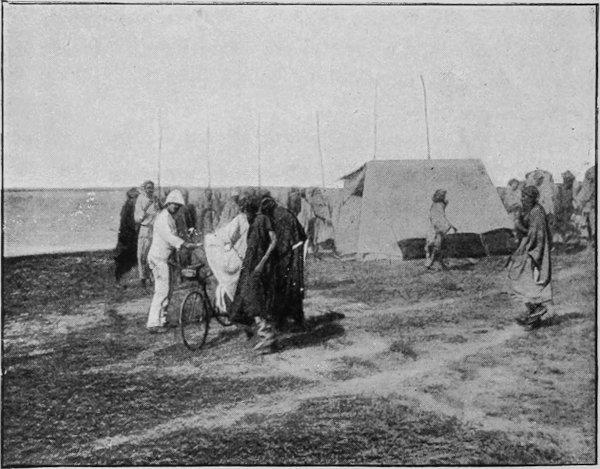
OUR BICYCLE SUZANNE AMONGST THE TUAREGS.
Baudry mounted our bicycle Suzanne, and to the intense astonishment of the Tuaregs spun round the flat ground separating our camp from a low line of dunes. The iron horse, as she was dubbed, very soon became celebrated far and near, and crowds came daily to stare at her.
